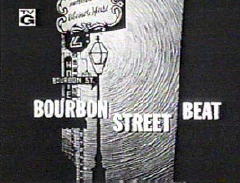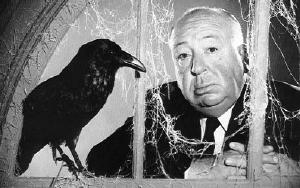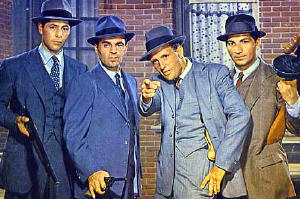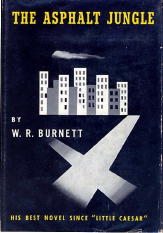Fri 7 Sep 2007
Tise Vahimagi: The TV credits of DAVID GOODIS and W. R. BURNETT
Posted by Steve under Authors , Mystery movies , TV mysteries[9] Comments
I am always fascinated by the credited (as well as the uncredited) work of interesting genre authors for television: not, generally, that it really signifies anything very much, but there is considerable satisfaction to be drawn from recognising, or kidding oneself that one recognises, the hand of a favourite author in some otherwise unremarkable small screen work.
Rather sadly, not too many such opportunities present themselves these days.
David Goodis is an interesting case in point: while his novels and his source-as-screenplays are duly honoured in their respective quarters (read, viewed, reviewed), his admittedly slim trail of TV credits have been all but forgotten.

Thank you, Mr. Nevins, for your astute observations once again (the Bourbon Street Beat segment). (I am still indebted to you for your enlightening article ‘Cornell Woolrich on the Small Screen’ in The Armchair Detective of Spring 1984.)
The earliest Goodis television credit that I’ve been able to unearth belongs to the live anthology series Sure As Fate (CBS, 1950-51), which staged ‘Nightfall’ in September 1950, adapted by Max Ehrlich and directed by Yul Brynner in his days as a studio director with CBS-TV. John McQuade featured as the young artist on the lam from both gangsters and police. A version of ‘Nightfall’ was also presented by (Westinghouse) Studio One in the following year (July 1951).
Edmond O’Brien and Maria Riva featured in ‘Ceylon Treasure’, adapted by Irwin Lewis from a Goodis story for Lux Video Theatre in January 1952. This was a Far East adventure yarn in which treasure hunter O’Brien tries to keep safe a fabulous sapphire against the larcenous efforts of Riva and her cohorts. Adapted from the 1953 short story “The Blue Sweetheart”, I believe.
In January 1956, Lux presented their version of Warner’s 1947 The Unfaithful, featuring Jan Sterling and Hugh Beaumont in a noirish tale of murder and infidelity. Benjamin Simcoe adapted the Goodis-James Gunn story and screenplay for the hour-long play.

The Alfred Hitchcock Hour (CBS/NBC, 1962-65) was one of the most effective chiller-suspense anthologies of its period, and it seems fitting that Goodis developed for the series the teleplay ‘An Out for Oscar’ from Henry Kane’s story My Darlin’ Evangeline (Dell, 1961). Telecast in April 1963, the multi-twist story has Larry Storch’s bank clerk being set up as the fall guy by his unfaithful wife (Linda Christian) and her killer boyfriend (Henry Silva) in a turnaround heist thriller.
An anthology package of more recent years, the superbly dark and diverting Fallen Angels (Showtime, 1993; 1995), presented the 1953 Goodis short story ‘The Professional Man’ (1995), with Brendan Fraser as a hit man with a conscience. Teleplay veteran Howard Rodman (Naked City, Harry-O) adapted the half-hour episode for director Steven Soderbergh.
By happy coincidence, another favourite from the past, W.R. Burnett, whose novel Dr. Socrates has recently been revived by O’Bryan House. It may therefore be of interest to overview the TV work of Burnett, another original whose credits cropped up on the small screen, albeit intermittently, between 1950 and 1967, but whose name as screen value seems now to have faded from view.

Following adaptations of his works, by others, for the anthology series Danger (with ‘Dressing Up’ in October 1950) and Studio One (‘Little Man, Big World’ in October 1952, from teleplay by Reginald Rose), Burnett supplied two notable teleplays for episodic series in 1960. The first was ‘The Big Squeeze’ (February 1960; co-scripted with Robert C. Dennis from Dennis’s story) for The Untouchables, an exciting hour with Dan O’Herlihy as a bank robbery mastermind (of almost Dillinger dimensions) capable of outwitting Robert Stack’s Eliot Ness at almost every turn.
The second teleplay, ‘Debt of Honor’ (November 1960) for the excellent Naked City series, was a moody, sensitive piece about gambler Steve Cochran repaying an old debt to a man in Italy by marrying the man’s daughter so that she can enter the U.S.
The following work was skipped from the above chronology because, while sharing Mr. Nevins’s dread of the Warner Brothers TV ‘sausage factory’ of the day, one still wonders what was made of the race-track thriller ‘Thanks for Tomorrow’ (October 1959) for 77 Sunset Strip. With a teleplay adapted by William L. Stuart — whose own 1948 Night Cry was turned into the memorable Where the Sidewalk Ends in 1950 by Preminger — from (and I’m not certain here) Burnett’s Tomorrow’s Another Day (1946), there just may be a little of something left to savor.

In 1961, MGM used the title of their 1950 Burnett/John Huston movie, The Asphalt Jungle, for a short-lived police detective series which, while fairly interesting in itself, bore absolutely no relation to the taut caper feature. Burnett was credited (with Paul Monash) for the screenplay of the European-released ‘feature’, The Lawbreakers (1961), an extended version of the series’ second episode (‘The Lady and the Lawyer’).
His non-crime genre work for television included John Ford’s 1955 baseball drama ‘Rookie of the Year’ (story only) for Screen Directors Playhouse, ‘Manhunt’ (1965) for The Legend of Jesse James, ‘The Hellcats’ (1967), a pilot episode co-scripted with Tony Barrett about barnstorming flyers in the 1920s, and ‘The Fortress’ (1967) episode of The Virginian series (co-story with Sy Salkowitz), focusing on a Canadian border manhunt.
Earlier talents and their moments of television (and cinema) remain, unfortunately, much in need of discovery.
September 8th, 2007 at 4:41 am
This Goodis information should be of great interest in Philadelphia for NoirCon (nee Goodiscon)
==============
Detectives Beyond Borders
“Because Murder Is More Fun Away From Home”
http://www.detectivesbeyondborders.blogspot.com/
September 11th, 2007 at 4:03 pm
I seem to recall that Goodis’ “Black Pudding” was adapted as an episode of HBO series THE HITCHHIKER, but a quick look around the web doesn’t turn up any evidence of this.
September 11th, 2007 at 4:07 pm
Ha, spoke too soon. Turns out is *was* adapted as an episode on HBO, but not on THE HITCHHIKER. Instead it was on some show called THE EDGE.
September 14th, 2007 at 9:19 am
My thanks to Graham for his lead on this additional Goodis credit – from which further investigation revealed a second new Goodis TV credit.
It seems that HBO’s The Edge (1989) was intended as a macabre, adult-oriented anthology series about people on the verge of physical or emotional breakdown. It even had an ominous face as host called The Watcher (Barry Sattels).
Produced by Lewis B. Chesler (who had been associated with The Hitchhiker series), Christopher Morgan (Quincy M.E., Hunter) and Gail Glaze (The Hitchhiker, Sins of the City), The Edge ran only three episodes; perhaps being a pilot/proposal shot?
The three shows presented were:
‘Black Pudding’ (23 August), with Alan Sharp composing the teleplay from the 1953 Goodis short story and featuring Brad Davis as an ex-prisoner seeking revenge on his former boss and unfaithful ex-wife (Kelly Lynch);
‘Indian Poker’ (30 August), scripted by Elia Kazan’s son Nicholas and taking its psychotic small town sheriff plot from Curtis E. Fischer’s short story, starring Rutger Hauer, Michael Rooker and Patricia Arquette;
and – arriving before the Fallen Angels presentation – ‘Professional Man’ (6 September), scripted and directed by Nicholas Kazan from the Goodis short story and starring Christian Slater as the hitman faced with the order to kill his girlfriend (Bridget Fonda). (Wasn’t there an early Evan Hunter story with a similar theme, Vicious Circle/Murder Comes Easy, 1953?)
I did a brief sweep of Amazon and one or two other possible DVD-release sites for a viewing copy of The Edge (as a 90-minute package) but came up empty. All I can say is: lucky those few who caught the HBO showings (10:00-10:30 pm Wednesdays) back in 1989.
January 21st, 2008 at 8:54 pm
Any idea where I could get my hands on copies of those Goodis “Lux Video Theatre” shows? I’ve made it my business to track down all that kind of stuff. 😉
January 22nd, 2008 at 12:12 am
Mike
Not yet. I’m going to have to start looking harder for all of these shows. Some of them have to exist.
Best
Steve
January 25th, 2008 at 10:28 am
I’ve got quite a few of the Goodis TV adaptations — collected them onto a DVDr. Just missing “Black Pudding”, the two “Lux Video” episodes, and the “Sure as Fate” version of NIGHTFALL.
May 15th, 2010 at 8:39 pm
[…] rundown of all of Goodis’s television credits, as well as W. R. Burnett’s. Check it out here. […]
January 10th, 2023 at 4:40 pm
I think that the Howard A. Rodman (https://www.imdb.com/name/nm0734912/), who scripted three episodes of forgotten – except by me! – Fallen Angels (“The Professional Man,†“The Frightening Frammis,†and “The Quiet Roomâ€), is not “[t]eleplay veteran Howard Rodman (Naked City, Harry-O) [who] adapted the half-hour episode for director Steven Soderbergh.†That Rodman (https://www.imdb.com/name/nm0734911/), who wrote for everything from Route 66 and Thriller to Have Gun – Will Travel and countless other television series, died in 1985, almost a decade before Fallen Angels aired. But it would have given great continuity to his career had it been true.
Otherwise some excellent research here. In the years since, anything else to add? Maybe this piece needs an update. I found the first Goodis segment of The Edge, “The Professional Man,†on YouTube: https://www.youtube.com/watch?v=qTlNsF1-6A8. Anyone have any luck tracking down “Black Pudding�